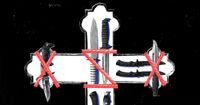What Could Prompt a Radical Transformation?
The question, “What would make you put down your Bible and pick up your gun?” invites a deep reflection on the conditions that might compel an individual to abandon longstanding principles of peace and contemplation in favor of violent resolve. This inquiry is rooted in an exploration of personal and societal pressures that challenge moral convictions and test one’s commitment to non-violence.
An Internal Battle of Beliefs
At its core, the dilemma juxtaposes faith and force. Many people turn to spirituality as a means to find solace, purpose, and ethical guidance. However, extreme circumstances—whether personal tragedies, political unrest, or acts of terror—can shatter that tranquility. In such moments, individuals might feel compelled to forsake traditional symbols of peace for tools that represent self-defense and retribution.
Weighing the Scales: Faith Versus Force
Historically, episodes of violence have occasionally pushed communities and individuals to question the efficacy of spiritual pacifism. When faced with imminent danger, some might perceive an armed response as the only viable path for survival or justice. This internal conflict underscores a broader societal debate: Can the principles of spiritual belief coexist with the instinctual need to protect oneself and loved ones through force?
Social and Cultural Impacts
Cultural expectations and historical narratives often shape one’s reaction to crisis. In environments where honor, vigilantism, or historical struggles for autonomy play a significant role, the decision to switch from a peaceful approach to one that embraces armed resistance may seem almost inevitable. This move represents more than a personal transformation—it is also reflective of the wider influence of community identity and the collective memory of past conflicts.
The Tipping Point
While many are raised with an ethos of forgiveness and compassion, there exists a critical threshold where the accumulation of personal distress and societal turmoil can push a person to reconsider these ingrained values. This turning point is not taken lightly; it is the outcome of a gradual erosion of faith in peaceful institutions, fostered by repeated exposures to violence and a growing distrust of established systems of justice.
Reflections on the Human Condition
The query at hand challenges us to examine the limits of human endurance in the face of injustice and cruelty. It prompts a broader discussion about the nature of belief, the legitimacy of self-defense, and the complexities inherent in choosing between adhering to one’s moral foundations and adapting to a hostile world.
Conclusion
Ultimately, the thought-provoking question serves as a call to understand the dynamics of belief and violence. It encourages a thoughtful analysis of what drives an individual to make such a dramatic shift in identity—from a peaceful seeker of truth to an armed defender in troubled times. The discussion remains open-ended, compelling us to continually assess how our societal norms and personal convictions shape our responses to the challenges of modern life.

Rockin’ the faith, one verse at a time!
Growing up, the Bible’s stories deeply impacted me. Now, with over 15 years of preaching experience, I blend timeless teachings with modern technology, making them relevant for today’s world.
Bible Hub Verse is my platform to share historical insights and thought-provoking articles, exploring both familiar and uncommon Christian topics. My passion is building a welcoming online space for everyone to learn, grow in their faith, and discover the Bible’s enduring message.
Join the journey!
God bless you.







